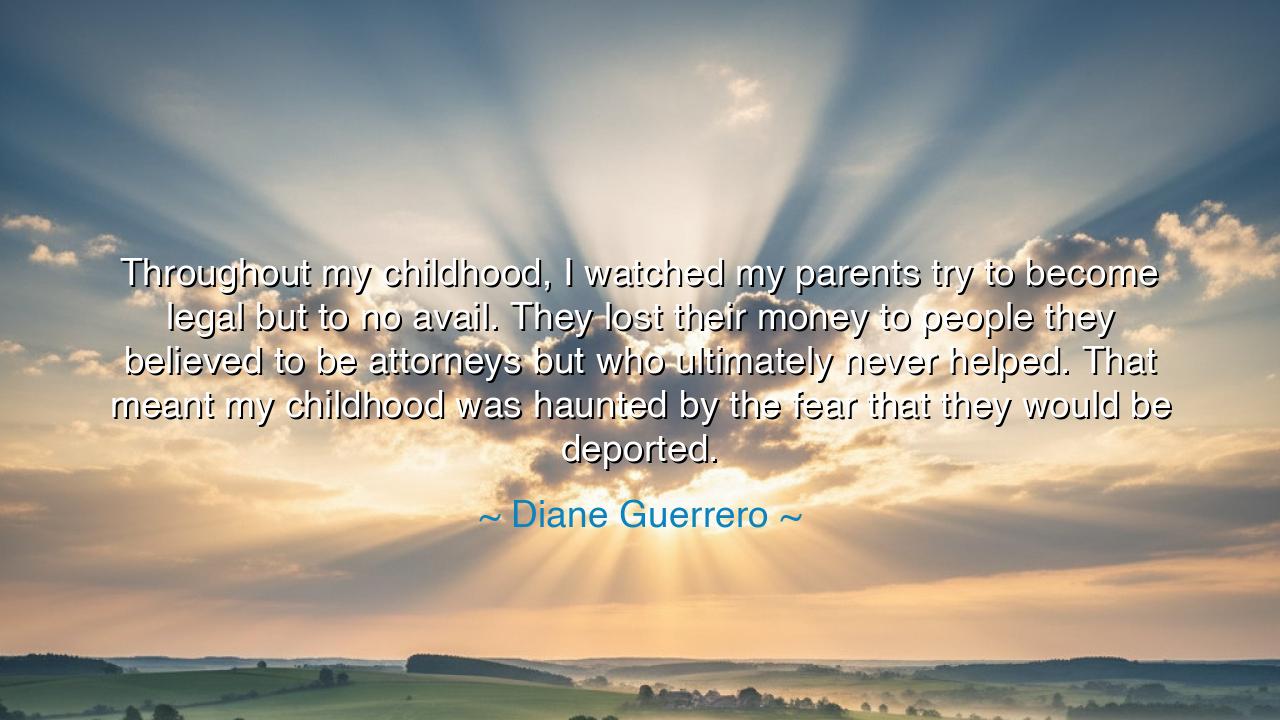
Throughout my childhood, I watched my parents try to become legal
Throughout my childhood, I watched my parents try to become legal but to no avail. They lost their money to people they believed to be attorneys but who ultimately never helped. That meant my childhood was haunted by the fear that they would be deported.






"Throughout my childhood, I watched my parents try to become legal but to no avail. They lost their money to people they believed to be attorneys but who ultimately never helped. That meant my childhood was haunted by the fear that they would be deported." Thus spoke Diane Guerrero, the actress and advocate, whose voice carries the weight of memory and the sorrow of countless children who grew up under the shadow of immigration’s harsh realities. Her words are not merely a personal story, but a testimony to the struggles of families who seek only dignity and belonging, yet are trapped in webs of deceit, bureaucracy, and fear.
The origin of this truth is as old as the migration of peoples. Across centuries, families have left their homelands in search of better lives, yet the road is never easy. In Guerrero’s story, her parents longed to be legal, to stand without fear, to build a future secure in the light of recognition. Yet instead of protection, they found exploitation; instead of lawyers, they found impostors who preyed upon their desperation. And in this betrayal, the family’s hope was wounded, leaving behind scars carried most heavily by the child who watched, powerless, as the dream slipped further away.
History offers us many mirrors to this tale. Consider the waves of immigrants who came through Ellis Island at the dawn of the twentieth century. Many were scammed by those promising quick paths to residency or citizenship, only to find themselves penniless and abandoned. Some were deported, others stranded, their children left to grow up in fear of separation. Guerrero’s story is not new—it is the continuation of an ancient pattern where systems are too complex, protections too weak, and the vulnerable are left to suffer.
Her words strike deeply because they reveal the child’s perspective—a perspective often ignored in policy debates. For the child does not carry the legal documents, but she carries the fear, waking each day wondering if her parents will still be there at night. She hears the whispers of raids, the silence of neighbors, the heavy sighs of parents defeated by corrupt officials. This is the hidden toll of broken systems: it is not only adults who suffer, but the children whose innocence is replaced by anxiety long before its time.
And yet, Guerrero’s reflection is also a cry for change. It tells us that families do not falter because they lack will, but because they lack access—access to honest guidance, fair processes, and protection from fraud. It is not laziness or neglect that haunted her family, but the cruelty of a system that closed its doors even as they knocked, and the predation of false helpers who robbed them while promising hope. Her words awaken us to the truth: justice delayed, justice denied, and justice corrupted can destroy more than lives—they can destroy childhoods.
The lesson here is both personal and universal. If we are to call ourselves just societies, then we must protect the vulnerable not only in law but in practice. Families seeking legality should not be prey for the dishonest. Systems should not be so tangled that only the wealthy can navigate them. And children must not be condemned to live in the shadow of fear because of papers their parents cannot secure.
What practical steps must we take? First, strengthen protections against fraud so that families are not deceived by false attorneys. Second, ensure that immigration systems are transparent, navigable, and humane. Third, offer support for children in such households, that they may grow not in fear, but in hope. And as individuals, we must open our eyes to the hidden suffering around us, offering compassion, advocacy, and solidarity with those whose voices often go unheard.
So let Guerrero’s words be carried forward: a childhood should be a time of growth, not fear; a family should be strengthened by law, not broken by it. And may we learn from her story that justice, when it falters, casts shadows over generations—but when it is upheld, it shines like a torch to guide the weary toward peace, dignity, and belonging.






AAdministratorAdministrator
Welcome, honored guests. Please leave a comment, we will respond soon